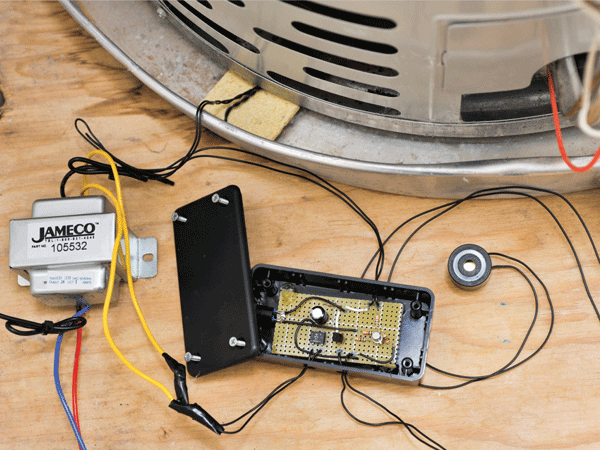
Electrical engineer and MAKE contributor Jeff Tregre has two 10-year-old hot water heaters in the attic of his New Orleans home, and knowing that 10 years is about the life expectancy of such heaters, he started researching water leak detection devices. Being a maker, he realized he could create his own system for much less than the going rate. The circuit he designed costs less than $25 and draws power from his doorbell transformer — convenient, since it too is in the attic and is on all the time, but you can use a dedicated transformer if need be. Jeff shares his how-to with us in the newest issue of MAKE, Volume 28, on newsstands now.
In his intro, Jeff writes:
Does this leak detector work? The answer is a big yes. Just a few weeks after I installed it, I came home from work and heard it buzzing. Upon investigation, I discovered that my primary water heater was leaking, and that its drain pan was clogged and already half full. My little circuit had saved the day.
Awesome! We’ve also shared Jeff’s build with you on Make: Projects, so you can get crackin on building your own today.
From the Pages of MAKE

MAKE Volume 28 hits makers’ passion for play head-on with a 28-page special section devoted to Toys and Games, including a toy “pop-pop” steamboat made from a mint tin, an R/C helicopter eye-in-the-sky, and a classic video game console. You’ll also build a gravity-powered catapult, a plush toy that interacts with objects around it, and a machine that blows giant soap bubbles. Play time is a hallmark of more intelligent species — so go have some fun!
12 thoughts on “Make a Water Leak Detector for $25”
Comments are closed.
ADVERTISEMENT
Join Make: Community Today










I’ve thought about such detectors as well. My concern is that the heater could rupture and make a big mess that can’t be stopped in time. My thought is to build a detector that shuts off the main water when a heater breaks and thus releases the water fast. With the main water shut off, the most a mess would be is the water in the tank coming out.
I need to revisit and photograph the steps I took to make my own combo, water detector and smoke alarm. (and then make it tinto a instructable
Basically i just ran some leads to the “press to test” button contacts on a $5 smoke alarm, and then i added a 2nd sonalert (buzzer, to change the pitch enough to tell which one it was). the elads then go to a small bit of circuit board (old remote control) with lots of traces and contacts, circuit board goes on my basement floor near my drain.
if it backs up, i hear it and can go check on it. (as a bonus it still works as a smoke detector, and will cherp to remind me to replace the batteries)
My father used to live in a house that would get water in the basement every couple years.
His water detector switch was incredibly simple: two striped wires on each side of an aspirin, holded together using a clothespin. He would put that on the ground, and when the water would rise it dissolved the aspirin, closing the clothespin and making the wires touch. That would close the circuit and sound the buzzer.
Pretty smart, and much cheaper than 25$.
Brilliant AND very clever idea. Was this your father’s original invention? I like it.
10 years? C’mon, start checking the sacrificial anode annually. Good idea though if you don’t see your water heater everyday. I’m fortunate mine is next to the washer and dryer.
I love making things. But here’s a 3-pack of leak detectors that I use, and which have saved me some grief, for under the aforementioned $25:
http://www.amazon.com/Zircon-Leak-Alert-Electronic-Batteries/dp/B002Q8GRPG/ref=sr_1_2?ie=UTF8&qid=1321920783&sr=8-2
Leak detection instruments are those electronic alarms that are used to detect water leaks. They are placed purposefully or tactically at those places where the probability of leak detection can be high such as under the toilet tanks or near the dishwasher.
Thanks a lot for your great posting I love this post very much.
This is really interesting. I never seen such kind of Leak Detector. It is really cheap. Thinks for this post.
Hey this is really interesting thanks for share, It is really helpful and it is not so costly. thanks for sharing.
Not to take anything away from this, but I made a similar detector when I was about ten years old (a very long time ago, pre-IC’s). My room was in the basement, so I had a vested interest in knowing if it was starting to flood.
The device was a spring clothespin with two screws through the jaws. The heads of the screws would touch each other when the clothespin closed.
Between the two screw heads I placed a un-coated aspirin. The wires from the screws went to a doorbell (old bell type) and a dry-cell battery. If any water got on the aspirin, it would quickly dissolve, allowing the screw heads to touch, completing the circuit and sounding the bell.
Simple is good……….
hello, it’s cheap service and i also do the same at my company http://alarabya.co
thanks